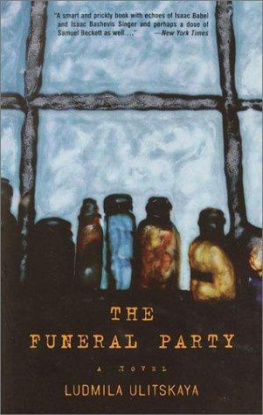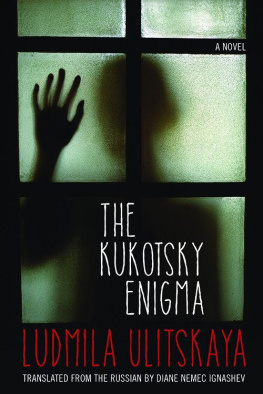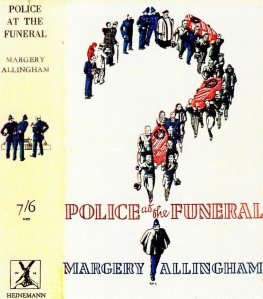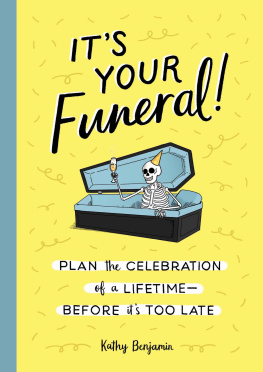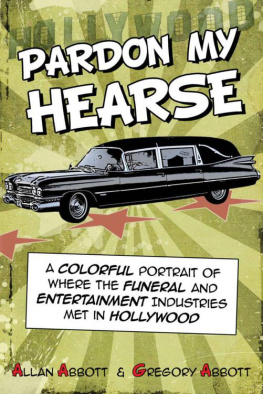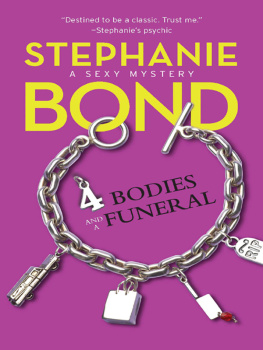Ludmila Ulitskaya - The Funeral Party
Here you can read online Ludmila Ulitskaya - The Funeral Party full text of the book (entire story) in english for free. Download pdf and epub, get meaning, cover and reviews about this ebook. year: 2002, publisher: Schocken, genre: Detective and thriller. Description of the work, (preface) as well as reviews are available. Best literature library LitArk.com created for fans of good reading and offers a wide selection of genres:
Romance novel
Science fiction
Adventure
Detective
Science
History
Home and family
Prose
Art
Politics
Computer
Non-fiction
Religion
Business
Children
Humor
Choose a favorite category and find really read worthwhile books. Enjoy immersion in the world of imagination, feel the emotions of the characters or learn something new for yourself, make an fascinating discovery.
- Book:The Funeral Party
- Author:
- Publisher:Schocken
- Genre:
- Year:2002
- Rating:3 / 5
- Favourites:Add to favourites
- Your mark:
- 60
- 1
- 2
- 3
- 4
- 5
The Funeral Party: summary, description and annotation
We offer to read an annotation, description, summary or preface (depends on what the author of the book "The Funeral Party" wrote himself). If you haven't found the necessary information about the book — write in the comments, we will try to find it.
The Funeral Party — read online for free the complete book (whole text) full work
Below is the text of the book, divided by pages. System saving the place of the last page read, allows you to conveniently read the book "The Funeral Party" online for free, without having to search again every time where you left off. Put a bookmark, and you can go to the page where you finished reading at any time.
Font size:
Interval:
Bookmark:
 The heat was terrible, with one hundred per cent humidity. It was as if the whole of this great city, with its inhuman buildings, its magical parks, its different coloured people and dogs, had reached the point of a phase transition, and at any moment its semi-liquefied people would float up into the soupy atmosphere.
The heat was terrible, with one hundred per cent humidity. It was as if the whole of this great city, with its inhuman buildings, its magical parks, its different coloured people and dogs, had reached the point of a phase transition, and at any moment its semi-liquefied people would float up into the soupy atmosphere.
The shower was permanently occupied, with a queue of people standing outside. For a long time they hadnt bothered with clothes, although Valentina wore a bra to prevent her large breasts chafing in the heat; normally she never wore one. Everyone was dripping wet, the sweat failed to evaporate from their bodies, towels didnt dry, and hair had to be dried with a hair-dryer.
The blinds were half-open and strips of light fell across the floor. The air-conditioning hadnt worked in years.
There were five women in the bedroom: Valentina in her red bra, Nina with her gold cross and long hair, so thin that Alik had once told her, Nina youre as skinny as that snake-basket. (The basket stood in a corner of the room; when Alik was younger he had gone to India in search of ancient wisdom, but the basket was all he had brought back with him.)
Also present was their neighbour Gioia, a foolish Italian woman who had moved into the building hoping to learn some Russian in this strange environment. Gioia was forever taking offence with people, but since they never noticed her imaginary slights she always magnanimously forgave them.
Irina Pearson, formerly a circus acrobat, now a high-paid lawyer, looked stunning with her waxed bikini-line and a new bust constructed for her by an American surgeon to look no worse than her old one. With her was her fifteen-year-old daughter, Maika, known as Teeshirt (maika means teeshirt in Russian). A plump, clumsy girl in glasses, she was the only one of them wearing clothes. She had on a pair of wide Bermuda shorts and of course a teeshirt, depicting an electric light-bulb and a luminous message saying FUCKIT! in Russian. Alik had made it for her birthday the year before, when he still more or less had the use of his arms.
Alik himself lay on a wide divan-bed, looking as small and young as his own son. He and Nina had no children, however, and it was obviously too late for them to have any. A sort of slow paralysis was consuming the last vestiges of his musculature, and his limbs lay meek and inert, neither dead nor alive to the touch, but in some transitional state, like setting plaster. The most alive feature about him was his cheerful shock of red hair that stuck up in front of his head like a brush, and his straggly moustache which appeared enormous on his emaciated face.
This was his second week at home. He had told the doctors at the hospital that he didnt want to die there. There were other reasons for this which they didnt know, and which he didnt tell them. But even in this high-speed hospitalwhere the doctors treated their patients like fast food cooks, with never enough time to look into their eyes, only their rear-ends, or their throats or wherever it was that was wrongeverybody loved Alik.
His apartment on the sixth floor was like a general thoroughfare, crowded from morning to night with people. Some would end up staying the night and it was an excellent place for parties, but for normal life it was hopeless, an old rehabilitated loft warehouse with the end partitioned off to make a tiny kitchen, a lavatory and shower-unit, and a narrow bedroom with a slice of window. There was also a large studio with two light sources.
In a corner of the studio was a carpet on which late guests and stray visitors would sleep. Sometimes there were as many as five of them on it. There was no front door, and people came in directly from the service lift. Before Alik moved in, bales of tobacco used to be brought up in this lift, and its smell still hovered in the air. It was almost twenty years since Alik had first arrived. He had signed the lease without really looking at it, and it had proved exceptionally advantageous to him as he still paid next to nothing for the place, although it was generally someone else who paid; it was a long time since he had had any money.
The doors of the lift clattered and Fima Gruber walked in, pulling off his pale-blue work shirt. The near-naked women paid no attention to him, and he appeared not to notice them either. He carried with him his grandfathers old medical bag, which he had brought over from Kharkov in the Ukraine. Fima was a third-generation doctor, an educated and original man, but somehow things hadnt worked out for him; he still hadnt managed to pass his exams in this country, and for the past five years had had a temporary job as a kind of qualified lab assistant in an expensive private clinic. He came to see Alik every day in the hope that he might strike lucky and be able to help him.
He bent over him now: How are you feeling, old man?
Oh, its you. Have you brought the timetable?
The timetable? Fima was puzzled.
For the ferry. Alik smiled weakly.
Its all over, his minds wandering, Fima thought, going to the kitchen and rummaging in the freezer compartment of the refrigerator for the ice-trays.
Morons, theyre all morons. I hate them, thought Maika. She had recently studied Greek mythology, and it was clear to her that Alik didnt have the South Ferry in mind.
Striding to the window with an angry, haughty expression, she lifted a corner of the blind and looked down at the street, where there was always something going on.
Alik was the first grown-up in her life to earn her respect. Like many American children, since early childhood she had been dragged from psychotherapist to psychotherapist, not without reason either, since she spoke only to other children, and was reluctant to make an exception even for her mother. Other adults didnt exist for her. The teachers at her school looked at her written work, clear, precise and laconic, shrugged their shoulders and gave her top marks. The psychotherapists thought up far-fetched theories to explain her strange behaviour; they loved unconventional children, they were their bread and butter.
Maika had met Alik at the opening of his exhibition. Irina had asked her clumsy daughter to accompany her soon after they moved to New York from California, and having suddenly lost all her friends, Maika agreed to go. Her mother had known Alik in her youth in Moscow, when she worked in the circus, but it was many years since they had last met in America, so many years that Irina had stopped wondering what she would say to him when they met again. When they did, he put his left hand on her jacket button, with a fat, shiny eagle which resembled a hen on it, twisted it sharply and tore it off. He threw it in the air and caught it, then opened his hand and glanced at it: Ive got to tell you something, he said.
His right hand hung lifelessly by his body. With his left hand he touched her thick, light-brown hair, each strand kept in place by a black silk bow edged with real pearls, and whispered in her ear: Irka, Im dying.
Oh, so youre dying, she thought; you died for me long ago. But a sharp blade twisted in the pit of her stomach, and she felt the pain running along the cut through to her spine. Maika stood nearby, watching her.
Lets go back to my place, Alik said.
Im with my daughter. I dont know if shell want to, Irina said, looking over at her.
Her little girl generally refused to go anywhere with her; she had barely managed to persuade her to come today.
You want to come to my artist friends studio? she asked her now, convinced that she would refuse.
But Maika merely said, The red-haired guy? Okay.
So they went. His new paintings reminded Irina of his old ones. A few days later they happened to be passing and called in again. At some point Irina was called to an urgent meeting and left Maika in the studio with Alik for a couple of hours. She returned to find them screeching at each other like two angry birds. Alik kept bobbing up and down, flapping his left arm; the right one was wasted and almost useless.
Font size:
Interval:
Bookmark:
Similar books «The Funeral Party»
Look at similar books to The Funeral Party. We have selected literature similar in name and meaning in the hope of providing readers with more options to find new, interesting, not yet read works.
Discussion, reviews of the book The Funeral Party and just readers' own opinions. Leave your comments, write what you think about the work, its meaning or the main characters. Specify what exactly you liked and what you didn't like, and why you think so.

